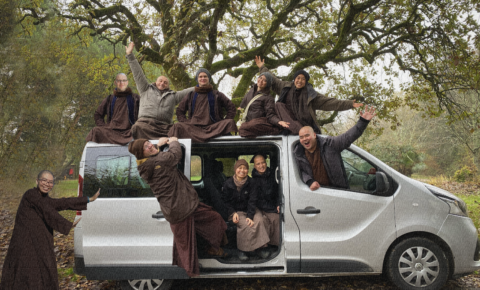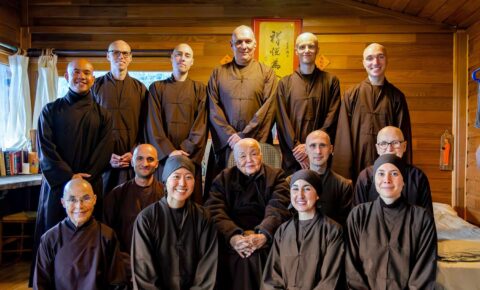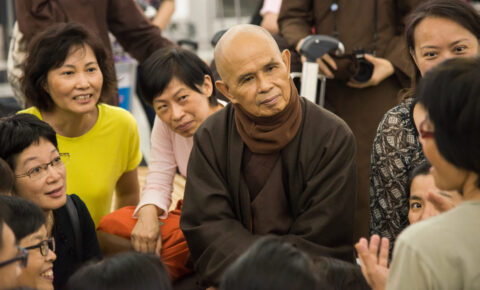Wake Up Schools
Village des Pruniers
Le Pey, Thenac
24240, France
www.wakeupschools.org
Ministry of Education and Training
No. 49 Đại Cồ Việt St.
Hai Bà Trưng District
Hà Nội, Việt Nam
bogddt@moet.edu.vn
27th June, 2013
RE: Bringing Mindfulness into Viet Nam’s Education
Dear Minister Phạm Vũ Luận,
We are a group of teachers, meditators and mindfulness practitioners working to bring mindfulness into the educational sector. We offer retreats and courses in Europe, America and Asia, to train educators and students in our integrated mindfulness training program which has been shown to increase effectiveness and wellbeing for individuals and school communities. Our largely Buddhist-based practices have been developed to meet the needs of 21st Century society in the West.
We are interested to collaborate with Viet Nam, with teachers, schools, and education organizations; to see if we could introduce the mindfulness practices into the school curriculum of Vietnam.
Our Partners
In the last 30 years, we have trained teachers in the US, the UK, France, Germany, Hong Kong, Thailand, India and Bhutan. In all these countries, schools, universities and governments are investing resources into the wellbeing and happiness of their teaching workforce, inspired by the example of Bhutan, where the welfare of its citizens, ecological sustainability and preservation of their culture goes hand in hand with economic development. We are confident that Vietnam and other ASEAN countries are also committed to going in this direction.
Our Programs
Research has found that stress is an inhibitor of learning and growth. People, especially young people, need tools to handle their stress and strong emotions; they need to develop emotional resilience. At the same time, studies have also shown that happiness enables the student to flourish and be stable, emotionally and socially through school and beyond. Young people need to train themselves to discern when they have enough; to learn that happiness is a mental attitude and is not dependent on external or material conditions. Young people need to learn how to stop, relax and slow down, in order to be more lucid and effective. Our mindfulness training programs equip young people with these skills, while helping them develop their mental fitness, creativity, effectiveness, and teamwork skills. Many experts predict mental training will be as important as physical fitness in the next century.
When a teacher or a student can learn how to handle their strong emotions such as anger, sadness, or jealousy, it creates a positive and enjoyable learning environment in the classroom. Earlier this year we were invited by educators in Singapore and South Korea—countries that have been admired for the quality of their education system—to offer our integrated mindfulness training program. In our training sessions we saw how much teachers and students were in need of practical tools in order to handle the tension, stress and anxiety that come along with the pressure to succeed in a global economy.
The countries we have been working with recognize that they need a global ethic to go along with their global economic progress; they recognize that the 21st Century is a century where interdependence is as important as independence. The progress of one nation, one people is no longer just an isolated matter in this era of globalization. They recognize they need to invest in a wisdom-based economy as well as a knowledge-based economy. Every country needs young people who are intellectually equipped to make good and wise choices throughout their lives that will make a positive contribution to their society, nation and environment. Education ministers in Thailand and Hong Kong, and leading education policy-makers in the US and UK have participated in our programs and have seen that our training responds concretely to these needs.
Vietnam
We recognize and applaud the steps Vietnam has taken to upgrade and improve her education system, so her teachers and students can be well-equipped to meet the demands and challenges of a modern economy. We know that you, as the Education Minister, are doing everything in your power so the young generation of Vietnam have the skills and qualifications they need to compete on the global stage.
The country is looking to the West for this, yet we also recognize that Vietnam is infused with her own rich tradition, in which education is an essential and valued aspect of national culture. We know that in Vietnam the love and care (tình) between teacher and student is a precious and unique cultural heritage. In fact, it was not so long ago that families would visit the teacher’s home on TẾT New Year’s Day to pay respect and offer thanks for educating and cultivating their child’s mind; and that teaching, as a career was a well-respected and prized position in society. How many other countries have love songs that praise their teachers and express the care between teacher and student? Our program offers a way to integrate modern educational models with timeless values by introducing the mindfulness practices that help preserve and nurture love and care (tình) within the classroom and the whole school.
Our Offering
Our training program has two different models: either a training conference for teachers and administrators from various institutions; or a training program in which the whole community of one school participates: teachers, students and parents alike. For example, in the UK we offered a 4-day training conference at the American School in London for 350 educators from around the world where teachers learned the practices to care for themselves and each other; and had opportunities to exchange ideas on ways to improve their classroom environment and the objectives education in general.
Whereas, in India our team came in and over 7 days we offered dedicated mindfulness training sessions to teachers, students and then also parents; the entire school was able to experience the practice together for an extended period and to appreciate the benefits of the mindfulness practice in creating a calm and joyful atmosphere.
We would like to explore with you ways that we could collaborate in bringing the practices of mindfulness into the schools in Vietnam. Similar to the UK or India examples above, our team could offer a 3-6 day teacher’s training conference in Hanoi, Danang or HCMC; or a weeklong program for a model school in any of these cities as well.
Lastly, we are delighted to be able to invite you as an honored guest to attend our upcoming 6 day training conference in Toronto, Canada August 11-16, 2013, titled “Happy Teachers Will Change the World”. We have reserved three spaces for you and two of your colleagues to participate and discover first hand with other teachers and people involved in education from around the world the benefits of our program.
More information can be found at the conference website: http://tnhtoronto.ca/#The+Retreat. We are looking forward to your response and please feel free to contact our Wake Up Schools team for any clarifications at: appliedethics@eiab.eu.
Yours sincerely,
Brother Pháp Dung
Wake Up Schools






Join the conversation